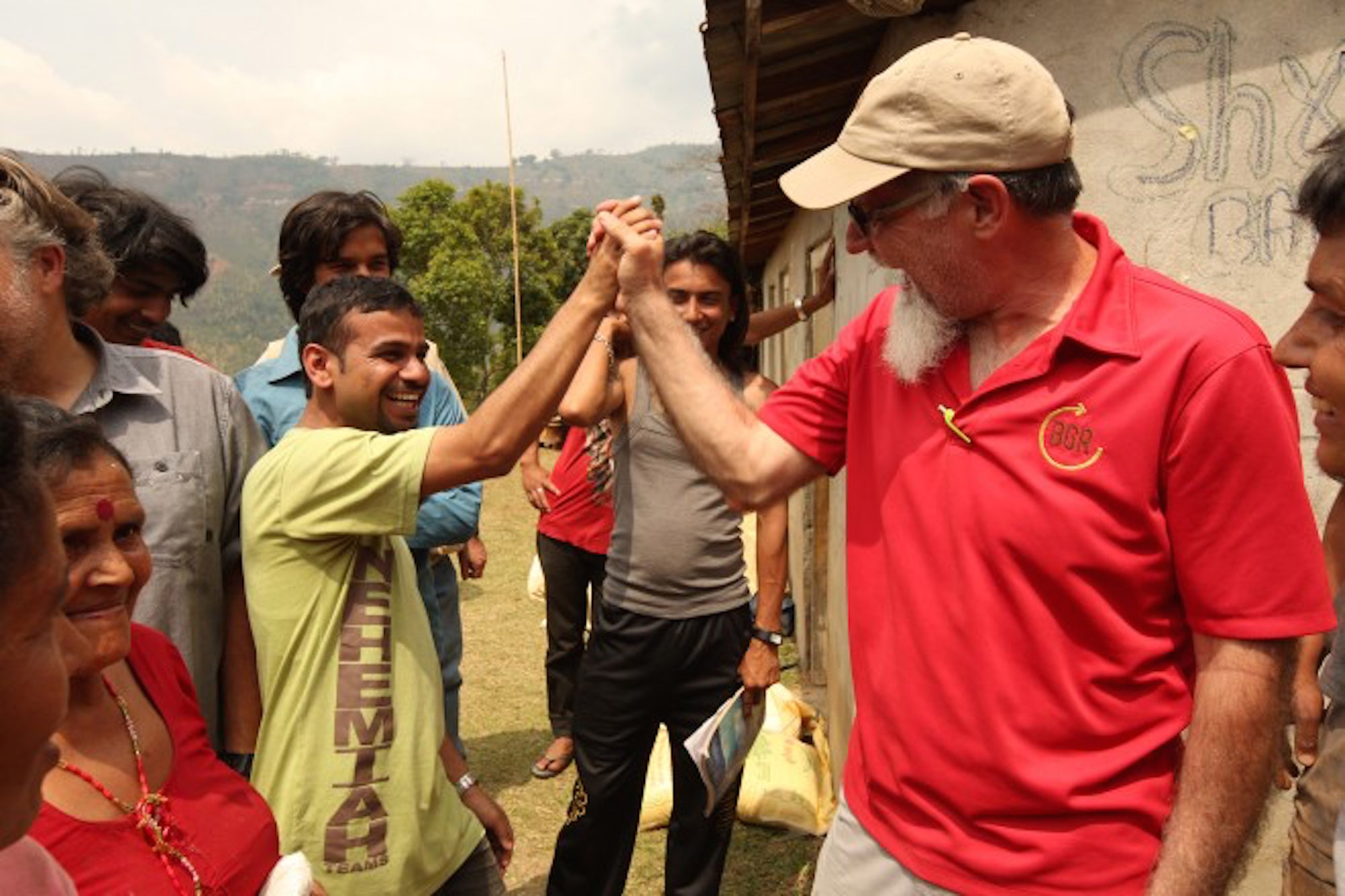
NEPAL (BP) — The Nepali man pulled brick after brick off a pile of rubble that was once his home. He passed along anything that was salvageable to his children to set aside. Finally, down in a hole, he found what he was looking for — their food storage.
The splintered, dusty woven basket held their entire harvest of rice. Before the April 25 earthquake in Nepal, this basket brimmed with white grains. Today, he pulled out one handful of red-stained rice.
“It might taste like dirt now, but we can still eat it,” he said. “It will fill our stomachs.”
He excitedly instructed the children to help sift through the rubble to find more food — garlic, onions, peppers and rice — in the remains of their home. Their tedious labor stopped abruptly when they heard shouting up the hill. A neighbor yelled down for everyone to come quick. Someone had brought food!
For days on end, the villagers took turns sitting on the edge of the main road trying to get help. From the road, you couldn’t even see their collapsed village up on the mountainside. They watched as big trucks of relief supplies passed them by, headed to larger towns down the road.
Hope of receiving any kind of help began to die little by little — until two vehicles backed down a rocky path just wide enough for a small truck and stopped in an open area. Loaded in the truck beds sat more than 40 giant bags of rice, provided by the Baptist Global Response.
A weathered grandmother excitedly clapped her hands as young men unloaded the 30-kilo bags. “The trucks kept passing us by, but not you,” she said over and over to anyone who would listen. “Now we have food!”
Finding ‘impact’ communities
Baptist Global Response continues to find pockets of need in Nepal. Their goal is to find five or six “impact communities” — like this village — to work in long-term. These are communities that have been hit hard by two devastating earthquakes just 17 days apart.
“These type of communities are away from the help of other organizations and meet the criteria which facilitates local church involvement and volunteer opportunities with our Southern Baptist partners,” Jeff Palmer, BGR’s executive director, said.
So far, BGR and their local partners have distributed 2,275 bags of rice that benefited more than 11,000 people. They plan to continue in this initial relief phase of food distributions and providing temporary shelter until impact communities have been identified and moved past the “just surviving” stage.
Francis Horton, who is coordinating the earthquake response for BGR, explained that this process is called “Disaster to Development.” He estimated it might take anywhere from six to 12 months and will require the help of local believers and Southern Baptist partners.
The Southern Baptist Disaster relief network is deploying two Rapid Assistance Teams to help with more distributions and clearing away some of the rubble. Their help will be welcomed in this village. Most of the mud-brick homes were totally destroyed.
‘Slowly, we will get it done’
From the spot where BGR distributed rice, the destruction is hard to see. You have to walk up a path to even get a glimpse. A group of children wanted to show her their homes to Claire Mullins,* a BGR partner in the Nepal earthquake relief effort.
Mullins followed the children. As they rounded a corner, she stopped dead in her tracks. The site was overwhelming. In the piles of broken brick and wood, two windows still stood in their frame. No walls around them, much less a house.
One girl pointed to the windows and said, “That’s my house.”
She and a friend joined hands and skipped over the rubble that was once a house. Mullins slowly followed after them. The girls stopped and pointed to a mound or rubble — the other girl’s home. Then they turned to another friend, who had been following shyly behind the group. This girl pointed to her home, a half collapsed structure that looked as if the remains would come tumbling down at any moment.
“That’s where we found her,” the oldest said, pointing to the shy girl, whose head was shaved and had a large contusion still soft to the touch. “She was buried in there and the whole village dug her out.”
One of their fathers walked past, hefting the big bag of rice BGR had delivered. He carried it down to a shelter he had fashioned in their bare cornfield. The girls skipped happily after him, eager to show Mullins their new home: a lean-to with three open sides. A tarp served as the roof. The back was the terrace wall of the mountainside field. Three families and their animals lived under it.
Mullins asked how they plan to rebuild their house and plant fields at the same time. The girls looked to the man and shook their heads as he responded. “Slowly … slowly,” the oldest girl translated. “Slowly, we will get it done.”
Volunteer requests are in process for teams to work with forgotten villages like this. Their needs are great. Most residents need to not only build temporary shelters for protection during monsoon season, but they also need to plant their crops. If they don’t get the seeds in the ground, it could jeopardize food security for next year.
*Name changed.
















